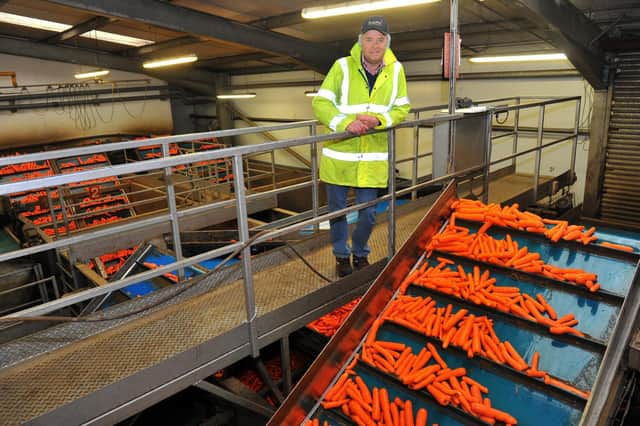Fruit and vegetable growers call on Government to help them thrive and feed the nation


Speaking on the first day of the Great Yorkshire Show, carrot grower and chairman of the National Farmers Union (NFU) regional horticulture board, Guy Poskitt, said growers are calling for a “more joined-up” approach from government to help businesses grow rather than decline.
“British horticulture is a real good news story, with the sector delivering 25 per cent of our national agricultural output, employing over 100,000 full time and seasonal workers and contributing over £3bn to the nation’s GDP,” Mr Poskitt said.
Advertisement
Hide AdAdvertisement
Hide Ad“However,” he warned, “as of now, our 200-plus Yorkshire growers are struggling to keep their heads above water in the face of soaring costs of production coupled with continuing labour shortages.”
Mr Poskitt said that if the sector is the achieve the “grand ambitions” government has set out in the recent food strategy White Paper, Ministers need to look at bigger picture.
“We very much welcome the Government’s acknowledgement of the importance of home-grown food production,” he said.
“But it is frustrating that, at the same time, other policies continue to deny growers access to the workers they need today as well as the investment needed to drive growth for tomorrow.”
Advertisement
Hide AdAdvertisement
Hide AdThis growing season has seen British horticulture report worker shortages topping 40 per cent with some producers saying they are cutting back on the number of crops being grown because they either don’t have the staff or can’t make a return in the face of mounting costs.
“From our perspective, the system is broken,” added Mr Poskitt. “We are still desperate for staff, with significant delays in accessing the Government’s Seasonal Worker Scheme, which continues to offer far fewer workers than the estimated 70,000 needed.”
He also highlighted a lack of government support for sector investment in technology which would help reduce the reliance on seasonal labour.
“In terms of support for investment in automation and robotic technologies, needed to reduce our reliance on seasonal workers, the sector has struggled in the past to access government schemes and those that are available are so stringent in their rules, regulations and timescales as to make them almost impossible to navigate.
Advertisement
Hide AdAdvertisement
Hide Ad“In other countries we see massive government support for their horticultural sectors. Here, there is talk about the potential to grow more and the opportunity for more glasshouse production to replace imported product and increase our food security, but with no thought as to where this level of investment will come from – especially in a sector where margins are tiny and risk levels are huge.”
As a result, Mr Poskitt said he is urging the Government to “join the dots” and work with growers to address short and long-term challenges.
“Everyone I know in horticulture has put everything they have into their businesses and pride themselves on providing the finest fresh produce from staples like peas, potatoes, onions and carrots to local specialities such as indoor winter rhubarb and an array of summer berries,” he said.
“We have huge potential to help meet a number of white paper targets including halving childhood obesity by 2030 and can help increase our national food security by growing more fresh fruit and vegetables, but not without a coherent plan.
Advertisement
Hide AdAdvertisement
Hide Ad“Locally, grower confidence is at a very low ebb. Many are wondering if they would sleep better at night growing wheat instead. We really need to see government commit to helping us survive today and plan for a healthy tomorrow.”
Strawberry farmer Annabel Makin-Jones said her business – Annabel’s Deliciously British – struggles with a shortage of labour.
“There are not enough numbers coming through,” she said.
“Trying to stop foreign labour leaves us struggling as a business and impacts on consumers. If we had someone who understood farming in the Government and spent time getting to know it, they wouldn’t do it.”
Annabel also highlighted the lack of Government support for new technology having invested around £300,000 in a picking line for her business.
Advertisement
Hide AdAdvertisement
Hide Ad“I wasn’t able to get a grant to help, I needed buy it myself which means people who really need the support can’t get it.
“We are a forgotten industry and the Government needs to be better at protecting its farmers.”
NFU President, Minette Batters said growers were facing “continuing challenges” with rising costs.
Speaking at the Great Yorkshire Show, Mrs Batters said growers were having to rely on working capital which was not sustainable and called for “fresh thinking” from politicians.
Advertisement
Hide AdAdvertisement
Hide Ad“We need Government to put its arms around production and recognise the challenges growers are facing trying to produce food.”
She also called for a ‘joined up’ approach towards policy looking at issues including water storage.